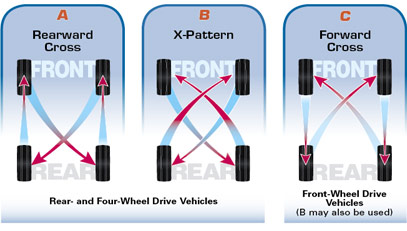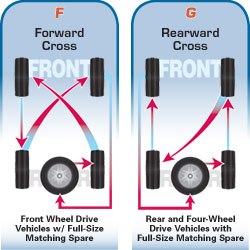Very interesting article on tire aging here:
http://www.tirereview.com/Article/101252/tire_aging_issue_addressed.aspx
Some excerpts:
"........In April, materials scientist John Baldwin bluntly schooled insiders at the annual Tire Industry Conference about things the rubber industry has known for decades from its own internal research. He pointed out that relying on tire tread depth to determine the viability of a tire is a bit of a c***shoot.........."
"..........Tire aging is caused by the thermo-oxidative degradation of the internal rubber that bonds the tires belts together that occurs over time, and is accelerated by heat, regardless of tire use. Once a tire is put into service the mechanical forces cause crack propagation beginning at the high-stress internal belt-edge area.
Preventing the internal cracks from expanding to a tread separation, before the tread wears out, is critical. With age and heat, the materials become less elastic and less capable of preventing this crack propagation. The tire industry has been studying and addressing these issues for decades and has mitigated the problem through design, including anti-oxidants, reduced air permeation and more robust belt edge construction. However, at the same time, tread life has gone up significantly, exposing tires to longer in-service periods........."
“.............The average full-sized spare tire is nine years old,” he (John Baldwin) said. “You can tell your tire store to take that perfectly good spare tire and put it on your car. But if you’re in Yuma or Miami, do you really want that nine-year-old spare going on? “Meanwhile, the average mini-spare is 12 years old. That means you’re screwed.”..............
http://www.tirereview.com/Article/101252/tire_aging_issue_addressed.aspx
Some excerpts:
"........In April, materials scientist John Baldwin bluntly schooled insiders at the annual Tire Industry Conference about things the rubber industry has known for decades from its own internal research. He pointed out that relying on tire tread depth to determine the viability of a tire is a bit of a c***shoot.........."
"..........Tire aging is caused by the thermo-oxidative degradation of the internal rubber that bonds the tires belts together that occurs over time, and is accelerated by heat, regardless of tire use. Once a tire is put into service the mechanical forces cause crack propagation beginning at the high-stress internal belt-edge area.
Preventing the internal cracks from expanding to a tread separation, before the tread wears out, is critical. With age and heat, the materials become less elastic and less capable of preventing this crack propagation. The tire industry has been studying and addressing these issues for decades and has mitigated the problem through design, including anti-oxidants, reduced air permeation and more robust belt edge construction. However, at the same time, tread life has gone up significantly, exposing tires to longer in-service periods........."
“.............The average full-sized spare tire is nine years old,” he (John Baldwin) said. “You can tell your tire store to take that perfectly good spare tire and put it on your car. But if you’re in Yuma or Miami, do you really want that nine-year-old spare going on? “Meanwhile, the average mini-spare is 12 years old. That means you’re screwed.”..............



